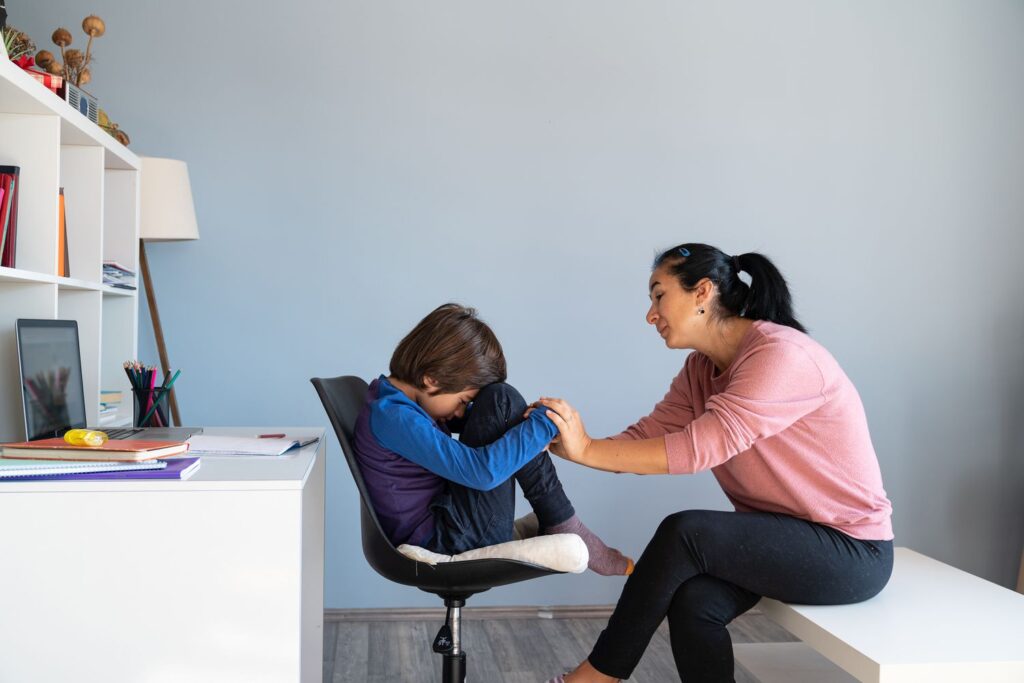How to Get Rid of Social Anxiety: A Practical Guide for Teens and Parents
Do your palms sweat before speaking in class? Do you avoid social gatherings or worry constantly about being judged? If yes, you may be experiencing social anxiety—a common yet often misunderstood emotional challenge, especially among teens and young adults.
At Kavach, we understand how isolating social anxiety can feel. That’s why our trained Child & Teen Therapists offer personalized one-to-one counseling to help young minds gain confidence and emotional strength. In this blog, we’ll explore what social anxiety is, what causes it, and most importantly, how to overcome it—step by step.
Why Does Social Anxiety Occur and What Does It Mean?
Social anxiety is more than just shyness. It’s an intense fear of being judged, rejected, or embarrassed in social situations. For children and teens, this can show up as avoiding school events, hesitating to speak in class, or feeling sick before a presentation.
Common triggers include:
- Public speaking or reading aloud
- Meeting new people
- Group discussions or classroom participation
- Fear of being laughed at or criticized
- Social media pressure and comparison
While everyone feels nervous sometimes, social anxiety disorder can seriously affect a child’s emotional well-being, academic performance, and ability to build healthy relationships.
Signs of Social Anxiety in Teens and Children
Identifying social anxiety early is important. Many children don’t talk about how they feel, so as a parent or teacher, being aware of signs is key.
Look out for:
- Avoiding eye contact
- Staying silent in social situations
- Complaining of stomachaches or headaches before events
- Fear of being watched while eating or speaking
- Negative self-talk like “I’ll embarrass myself”
- Low self-esteem or feelings of inadequacy
If these behaviors are frequent, it’s a sign that your child may be struggling with social anxiety and could benefit from gentle support or counseling.

How to Get Rid of Social Anxiety: Step-by-Step Strategies
Now that we understand what social anxiety is, let’s talk about how to overcome it. The journey isn’t overnight, but with the right tools and emotional support, your child can start feeling more comfortable and confident in social situations.
1.Understand and Acknowledge the Fear
The first step is awareness. Support your child in naming and talking about their emotions. Instead of dismissing fears with “Don’t worry, it’s nothing,” say: It’s okay to feel nervous sometimes. Want to talk about what’s worrying you?”
When children feel heard, their anxiety often reduces. At Kavach, we use emotional regulation techniques to help children name, validate, and manage their emotions.
- Challenge Negative Thoughts
Children with social anxiety often fall into thinking traps:
- Everyone will laugh at me.
- If I make a mistake, I’ll never be able to face them again.
Help your child challenge these thoughts by asking
- What’s the worst that could happen?
- Has this ever happened before?
- What kind words would you say to a friend who was feeling this anxious?”
Replacing irrational fears with facts helps reduce anxiety over time.
- Practice Social Skills in Safe Environments
One effective way to build confidence is through gradual exposure. Start small:
- Practice introducing themselves at home
- Role-play conversations
- Encourage them to order food at a café
- Let them share something in a small group
The goal isn’t to eliminate fear completely—but to show them they can handle it.
4. Teach Breathing and Relaxation Techniques
Deep breathing calms the nervous system and reduces physical symptoms like shaking hands or rapid heartbeat.
Try this exercise together:
- Use the 4-4-6 method: breathe in for 4 seconds, hold for 4, and breathe out for 6 seconds.
- Repeat this 4–5 times before a social event or stressful moment.
- You can also introduce mindfulness or short meditations to create a sense of calm and self-awareness.
5. Build Self-Esteem Through Strengths
Children with social anxiety often focus too much on what they can’t do. Help them notice their strengths—creativity, kindness, humor, curiosity.
Celebrate small wins:
- You said hello to the shopkeeper today—well done!
- You raised your hand in class. That was brave.
Small acknowledgments boost confidence and reduce fear of social interaction.
6.Limit Avoidance Behavior Gently
Avoiding social situations may feel like a relief in the short term—but it strengthens anxiety in the long run. Encourage your child to face challenges in bite-sized steps, without forcing them.
Remember:
- Let’s try it together for 5 minutes” is better than
- You have to go, no excuses.
At Kavach, we use graded exposure therapy, a gentle way to help kids and teens gradually face their fears with support.
- Seek Professional Counseling When Needed
Sometimes, social anxiety goes beyond what home support can manage—and that’s okay. Asking for help shows strength, not weakness.
At Kavach, our trained therapists work with children and teenagers to:
Understand the roots of their anxiety
- Learn healthy coping skills
- Improve communication and self-expression
- Rebuild confidence and self-worth
- Our sessions are confidential, compassionate, and personalized—designed to meet each child at their emotional level.
Book a free consultation at www.kavach.net.in
How Parents Can Support a Child with Social Anxiety
Parents and caregivers are the first line of emotional support for children. Here are a few tips:
- Avoid labeling them as “shy” or “awkward”
- Encourage effort, not just results
- Celebrate even small acts of bravery
- Keep communication open and judgment-free
- Avoid comparisons with other kids
- Create a home environment where mistakes are safe
Remember: progress may be slow, but consistency, patience, and love can go a long way.

Final Thoughts: Social Anxiety Can Be Overcome
Social anxiety can feel overwhelming—but it’s also manageable. With the right mix of self-awareness, practical tools, and emotional support, children and teens can learn to thrive in social situations, build meaningful connections, and feel confident in their own skin.
At Kavach, we are here to walk with you and your child every step of the way. No one has to fight anxiety alone
Leave a Reply